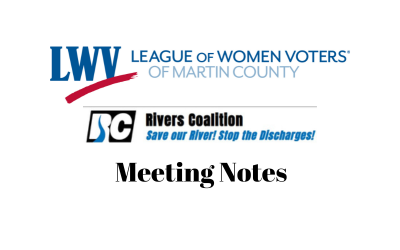Important County Commission Meeting Agenda for 4/30
Martin County Commissioners will vote on four Rural Lifestyle development proposals on Tuesday in a lengthy and complex agenda.
In addition to proposals to advance the Calusa Creek Ranch and Discovery projects, Commissioners will consider an assessment for the Harbor Estates/Gaines Avenue water main extension, a plat for the Pentalago Phase II project in Palm City, and a draft of a tentative $1.22 billion Capital Improvements Plan for Fiscal Year 2025.
Agenda Items PH-3 and PH-4 seek approval of a Comprehensive Plan text amendment and a Future Land Use Map amendment to authorize development of the 3,460-acre Calusa Creek Ranch project, now known as the Ranch Planned Unit Development. More than 250 pages of Public Comments – mostly in opposition to the project – are included in the agenda summary, although many recent adverse comments have been omitted by staff. The Ranch PUD, which is located more than a mile outside the Urban Services Boundary, would allow extension of public utilities and clustered residential development including 175 single-family homes, two golf courses and a boat docking facility on land now designated for agricultural use.
In recommending approval of the amendments, staff ignores South Florida Water Management District comments which opposed the FLUM amendment because the property is located within the Comprehensive Everglades Restoration Plan (CERP) footprint and the proposed project fails to provide assurance of adequate stormwater management and water quality protection.
Commissioners Sarah Heard and Harold Jenkins voted against the Calusa Creek Ranch amendments when they were transmitted to state agencies for review. The amendments were approved by Commissioners Ed Ciampi, Doug Smith and Stacey Hetherington.
Tuesday’s vote seeks final approval of the amendments along with a proposal to adopt a Planned Unit Development Agreement for the Ranch PUD and a master and phasing development plan for the project on SW Kanner Highway near SW Bridge Road (Agenda Item PHQJ-1).
NOTE: Commissioners who vote to approve the Ranch PUD amendments will be voting to destroy the Urban Services Boundary and allow adverse impacts to land within CERP to restore the Everglades. Can these Commissioners be trusted to properly spend millions of taxpayer dollars raised by a half-cent sales tax increase to acquire environmentally sensitive lands for conservation? Voters should think twice about approving the half-cent sales tax referendum in November if Commissioners approve the Ranch PUD amendments and continue to allow irresponsible development in rural and environmentally important lands.
Agenda Item DPQJ-2 seeks approval of a plat for another Rural Lifestyle project that was previously approved – Discovery – to develop 317 single-family residential lots off SW Bridge Road near the I-95 interchange in Hobe Sound.
Comp Plan amendments to facilitate the Discovery project were approved by Commissioners Harold Jenkins, Doug Smith and Stacey Hetherington (who assured voters before her re-election that she would oppose the project and then flip-flopped to cast the deciding vote in favor of Discovery at the first Commission meeting after the election).
Staff has failed to insist on compliance with the ordinance that requires full disclosure of individuals who benefit from development approvals by submitting a “Disclosure of Interest Affidavit” that identifies “every natural person and entity with any legal or equitable interest in the property” which is the subject of the application. The Disclosure of Interest Affidavit for Discovery identifies five limited liability companies but names only one person as an owner of two of the five entities.
The purpose of the Disclosure of Interest Affidavit is to make sure that the public knows whether any commissioners, staff members, campaign donors, or lobbyists will benefit from approval of a development application. In a common and clearly intentional violation of the Martin County Land Development Regulations, staff consistently refuse to insist on properly completed Disclosure of Interest Affidavits despite repeated requests for compliance. The Affidavit submitted to the Local Planning Agency earlier this month for the Calusa Creek Ranch application was “amended” by the County Attorney’s Office at the last minute, after citizens complained about failure to disclose the names of individuals who own the property.
In addition to the Discovery plat, Commissioners will vote to approve a plat for the Pentalago Phase II project for 16 of 42 units in the single-family subdivision north of I-95 and east of SW Citrus Boulevard in Palm City. (Agenda Item DPQJ-1)
Item PH-1 seeks approval of a final assessment resolution to extend public water lines to the Harbor Estates/Gaines Avenue area at a cost of $9,808.53 per unit, payable at an annual rate of $627.32 for 20 years beginning in November 2025.
A workshop is scheduled as Agenda Item WORK-1 to review the tentative Capital Improvements Plan for Fiscal Year 2025, which begins October 1. The tentative Plan includes expenditures of $1,223,918,591.00 with revenues of $909,942,256.00 over 10 years. The most costly categories for proposed Capital Improvements are roads, utilities, coastal, public buildings and law enforcement. The least costly categories are the library, public transit, solid waste, fire rescue, the airport, and ecosystem restoration and management.
The Consent Agenda includes 19 items that will be approved in a single vote at the beginning of Tuesday’s meeting without public discussion of any of the proposals, including:
– Item CNST-2, the Clerk’s Warrant disclosing expenditures of $29,566,363.14 in taxpayer dollars between March 25 and April 14, 2024, without disclosing the names of the payees or the purpose of the payments;
– Items CNST-11, CNST-12 and CNST-13 approving reductions in code enforcement fines to be collected by the County from $1,589,152.50 to $58,825.00;
– Item CNST-15 accepting SW Earl Avenue in Palm City into the County Road Inventory, converting the roadway from private to public ownership and maintenance, with the cost of constructing needed improvements to be paid by taxpayers; and
– Item CNST-19 approving an agreement for the County to provide building official, inspection and plan review services to the Village of Indiantown for one year, with the Village to reimburse the County $130.00 an hour for the Building Official’s time, $117.50 an hour for the Assistant Building Official’s time, and $105.00 an hour for Inspector’s and Plan Reviewer’s time.
Other items on the public portion of the agenda include:
– Item DEPT-2 seeking approval of more than $3.5 million in contracts for water main extension within the Harbor Estates/Gaines Avenue area ($1,444,778.00 to Jamie Underground, Inc.), tree pruning, removal and installation on road rights-of-way and County-owned properties ($1,000,000 over 5 years to All Florida Tree and Landscape, Inc., Sherlock Tree Company (no relation to Ginny Sherlock) and Tri-Brothers Tree and Landscaping, Inc.), and Bathtub Beach and Sailfish Point beach renourishment ($1,095,879.52 increase to previously approved contract for $5,921,000.00 making a total contract of $7,016,879.52 to Atlantic & Gulf Dredging and Marine, LLC);
– Item DPQJ-3 seeking a resolution to grant a variance to reduce the required width from 50 feet to 30 feet for a portion of NE Mango Terrace off Skyline Drive in Jensen Beach and to accept the as yet unbuilt roadway into the County Road Inventory (there are no reports or permits included in the agenda summary to confirm that the proposed roadway will meet requirements of the County engineering division for open roads);
– Item DEPT-5 seeking approval of a request by the Martin County School Board to place a referendum on the November general election ballot to renew an ad valorem tax increase by up to one-half mill per year for four years; and
– Item DEPT-3 seeking concurrence by the Board of County Commissioners with the selection of Nicholas Clifton as administrator of the Florida Department of Health in Martin County (to be heard at 9:30 a.m.).
The meeting begins at 9:00 a.m. Tuesday in Commission Chambers at the Martin County Administration Center. Attend in person, watch on MCTV or livestream the meeting from the County website at http://martin.granicus.com/ViewPublisher.php?view_id=24.
Agenda items may be viewed and downloaded at https://martin.legistar.com/DepartmentDetail.aspx?ID=35023&GUID=98D7CC54-EF7D-4C4C-8084-1AF34C623D6E
E-mail commissioners about matters that interest you at sheard@martin.fl.us, eciampi@martin.fl.us, dsmith@martin.fl.us, hjenkins@martin.fl.us, shetherington@martin.fl.us with copies to the County Administrator and County Attorney at ddonalds@martin.fl.us and swoods@martin.fl.us.


